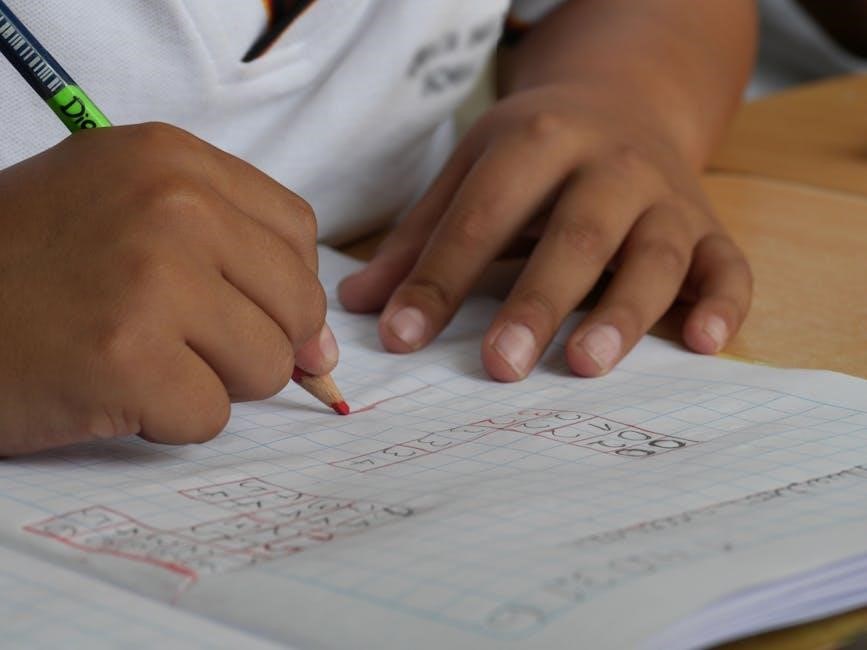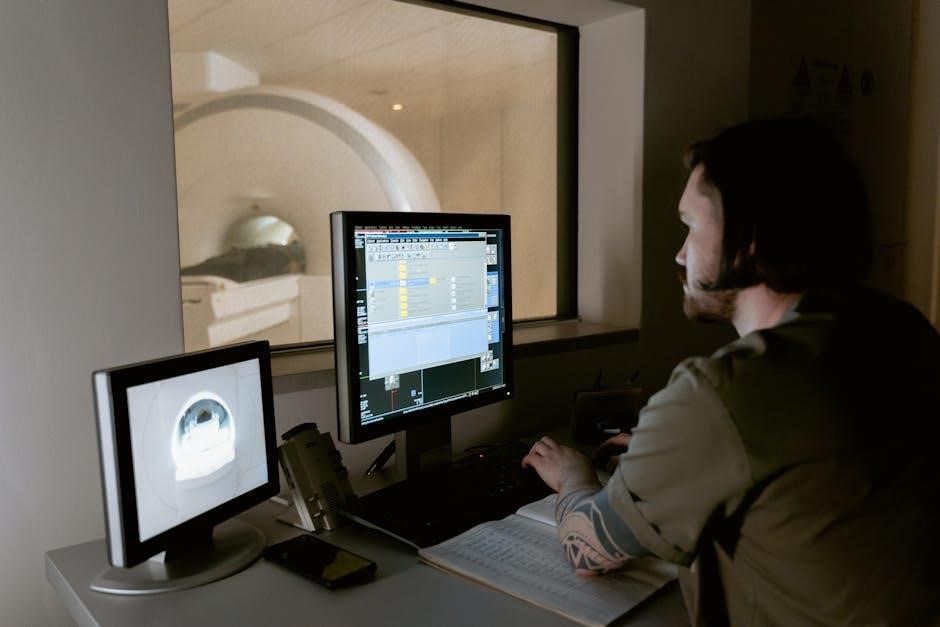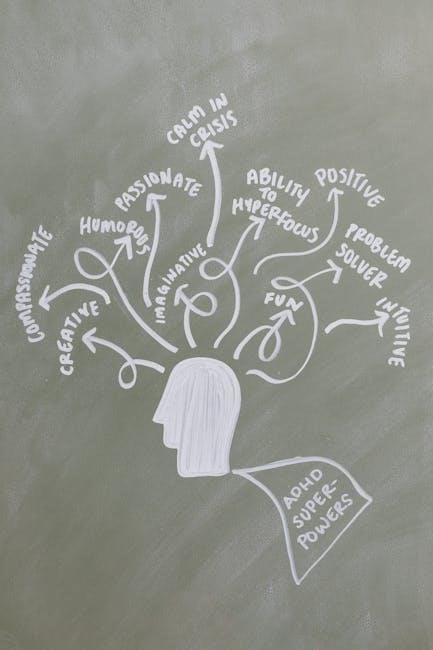The Conners Adult ADHD Rating Scales (CAARS) is a comprehensive tool for assessing ADHD symptoms in adults. The CAARS Test PDF offers a standardized, practical resource for mental health professionals to evaluate ADHD symptoms through self-report and observer-rated forms, aiding in accurate diagnosis and treatment monitoring.
Overview of the CAARS ADHD Test
The Conners Adult ADHD Rating Scales (CAARS) is a widely used assessment tool designed to evaluate symptoms of Attention-Deficit/Hyperactivity Disorder (ADHD) in adults and adolescents. It provides a comprehensive evaluation of ADHD symptoms, including inattention, hyperactivity, and impulsivity, across various settings. The test is available in a convenient PDF format, making it easily accessible for clinicians, researchers, and patients. CAARS assesses both self-reported and observer-rated behaviors, offering a well-rounded perspective on ADHD symptoms. Its structured format and standardized scoring system ensure reliability and accuracy in diagnosing ADHD. The CAARS ADHD Test PDF is a valuable resource for professionals seeking to understand and manage ADHD effectively.
Importance of the CAARS Test in ADHD Diagnosis
The CAARS test plays a pivotal role in ADHD diagnosis by providing a standardized and reliable method to assess symptoms in adults and adolescents. Its structured format ensures consistency, while its focus on key domains like inattention and hyperactivity offers deep insights. The availability of the CAARS test in PDF format enhances accessibility for clinicians, facilitating its use in various clinical settings. By offering both self-report and observer-rated assessments, it provides a comprehensive evaluation, which is crucial for accurate diagnosis. This tool not only aids in identifying ADHD but also helps monitor treatment progress, making it indispensable in clinical practice and research. Its widespread use underscores its importance in modern ADHD assessment.

What is CAARS?
CAARS stands for Conners Adult ADHD Rating Scales, a tool to assess ADHD symptoms in adults and adolescents, available as a PDF for clinical and research use.
Definition and Purpose
The Conners Adult ADHD Rating Scales (CAARS) is a psychological assessment tool designed to evaluate symptoms of Attention-Deficit/Hyperactivity Disorder (ADHD) in adults and adolescents. Its primary purpose is to provide a comprehensive evaluation of ADHD symptoms, including inattention, hyperactivity, and impulsivity. The CAARS test is available in a convenient PDF format, making it easily accessible for clinicians, researchers, and educators. It includes both self-report and observer-rated forms, allowing for a multi-perspective assessment of ADHD symptoms. By identifying the presence and severity of ADHD symptoms, the CAARS test helps guide diagnosis, treatment planning, and monitoring of treatment efficacy. It is widely used in clinical and research settings.
Target Population
The CAARS ADHD test is designed for individuals aged 12 and older, making it suitable for adolescents, adults, and older adults. It is particularly useful for assessing ADHD symptoms in both clinical and non-clinical populations. The test is appropriate for individuals suspected of having ADHD, as well as those already diagnosed, to monitor symptom progression. It is also used to evaluate individuals with related disorders or comorbid conditions. The CAARS test is widely applied in clinical, educational, and workplace settings, making it a versatile tool for understanding ADHD symptoms across different age groups and environments. Its accessibility in PDF format enhances its usability for psychologists, educators, and healthcare professionals.
Key Features
The CAARS ADHD test is renowned for its comprehensive assessment of ADHD symptoms in individuals aged 12 and older. It evaluates key domains such as inattention, hyperactivity, impulsivity, and executive functioning. The test includes both self-report and observer-rated forms, ensuring a well-rounded evaluation. Its clear scoring system provides standardized results, making it reliable for diagnostic purposes. The CAARS test is also available in a convenient PDF format, allowing easy access and administration. It is widely used in clinical, educational, and research settings due to its ability to monitor treatment progress and provide detailed insights into ADHD symptoms. This makes it a valuable tool for professionals assessing and managing ADHD.

Structure and Components
The CAARS ADHD test is organized into clear sections, including self-report and observer-rated forms, each assessing specific domains like inattention, hyperactivity, and impulsivity through standardized scales.
Domains Assessed
The CAARS ADHD test evaluates core symptom domains of ADHD, including inattention, hyperactivity, and impulsivity. It also assesses related areas such as executive functioning deficits, emotional regulation, and interpersonal difficulties. The test provides a comprehensive profile of ADHD symptoms and their impact on daily functioning. Each domain is measured through standardized scales, ensuring reliable and consistent assessment. By focusing on these key areas, the CAARS test helps clinicians identify the presence and severity of ADHD symptoms, aiding in accurate diagnosis and treatment planning. This structured approach ensures a thorough evaluation of ADHD-related challenges across various aspects of an individual’s life.
Sections of the CAARS Test
The CAARS test is divided into distinct sections designed to gather comprehensive information about ADHD symptoms and their impact. The test includes a screening section with 30 items to identify potential ADHD symptoms. This is followed by an in-depth assessment covering executive functioning, emotional regulation, and interpersonal relationships. Additional sections focus on specific scales, such as inattention, hyperactivity, and impulsivity, providing a detailed evaluation. The test also includes observational forms for teachers, parents, or employers to provide external perspectives. Each section is structured to ensure a thorough and accurate assessment of ADHD symptoms, aiding in diagnosis and treatment planning. This multi-faceted approach enhances the reliability of the results.
Self-Report vs. Observer-Rated Forms
The CAARS test includes both self-report and observer-rated forms to provide a comprehensive assessment of ADHD symptoms. Self-report forms allow individuals to evaluate their own experiences, offering insights into internal feelings and behaviors. Observer-rated forms, completed by parents, teachers, or employers, provide an external perspective on observable behaviors. This dual approach ensures a balanced evaluation, as self-reports may capture subjective experiences, while observer forms highlight overt symptoms. Both versions are standardized, ensuring reliability and consistency. The combination of self and observer ratings helps clinicians make accurate diagnoses and develop effective treatment plans, addressing both internal and external manifestations of ADHD. This dual perspective enhances diagnostic accuracy and treatment outcomes.

History and Development
The Conners Adult ADHD Rating Scales (CAARS) were introduced in the 1990s by Dr. C. Keith Conners. It assesses ADHD symptoms in adults, aiding diagnosis and research.
Creation by Dr. C. Keith Conners
Dr. C. Keith Conners, a renowned psychologist, developed the Conners Adult ADHD Rating Scales (CAARS) in the 1990s; Recognizing the need for a comprehensive tool to assess ADHD in adults, Conners designed the test to evaluate symptoms like inattention, hyperactivity, and impulsivity. His expertise in ADHD research and clinical practice informed the creation of a reliable and validated instrument. The CAARS test pdf became a cornerstone in adult ADHD diagnosis, offering both self-report and observer-rated forms. Conners’ work significantly advanced the understanding and assessment of ADHD in adults, providing clinicians with a standardized method to identify and manage symptoms effectively. His contributions remain foundational in the field.
Evolution to CAARS 2
The CAARS ADHD test pdf evolved into CAARS 2, an updated version designed to improve assessment accuracy and usability; Building on the original framework, CAARS 2 incorporates enhanced validation procedures, updated normative data, and refined scales to better capture ADHD symptoms in adults. It addresses feedback from clinicians and researchers, offering a more robust tool for diagnosis and monitoring. The revised version includes new items and improved scoring guidelines, ensuring alignment with current diagnostic criteria. CAARS 2 also introduced shorter forms for screening purposes, making it more accessible for practitioners. This evolution reflects ongoing advancements in ADHD research and clinical practice, enhancing its utility in real-world applications.

CAARS vs. CAARS 2
CAARS 2 enhances the original with updated norms, refined scales, improved reporting, and addresses user feedback, aligning with current ADHD research and clinical guidelines effectively.
Differences Between Versions
The CAARS and CAARS 2 differ in their approach to assessing ADHD symptoms. CAARS 2 introduces updated norms, additional scales for emotional and cognitive difficulties, and improved clinical interpretation tools. It also includes items addressing DSM-5 criteria, enhancing diagnostic accuracy. The revised version incorporates feedback from clinicians and researchers, refining item content for better sensitivity. CAARS 2 provides more nuanced assessments of ADHD presentations, including inattention, hyperactivity, and impulsivity, while addressing co-occurring symptoms. These updates ensure the test aligns with contemporary understanding of ADHD, offering a more comprehensive evaluation compared to its predecessor. This evolution reflects advancements in ADHD research and clinical practice.
Enhancements in CAARS 2
CAARS 2 offers several enhancements over its predecessor, providing a more refined and accurate assessment of ADHD symptoms. It includes updated normative data to better reflect diverse populations and improved item content for enhanced sensitivity. The new version aligns with DSM-5 criteria, ensuring relevance to current diagnostic standards. Additional scales for emotional and cognitive difficulties have been added, offering a broader understanding of ADHD presentations. Clinical interpretation tools have been refined, aiding in more precise diagnosis and treatment planning. These enhancements improve the test’s reliability and validity, making it a valuable tool for clinicians and researchers in assessing ADHD effectively across various settings.

Normative Data and Scoring
The CAARS ADHD Test PDF uses standardized norms based on a large normative sample to assess ADHD symptoms. Scoring categorizes individuals into percentiles, indicating symptom severity.
Normative Sample
The CAARS ADHD Test PDF relies on a large, diverse normative sample to ensure accurate assessment of ADHD symptoms. This sample includes individuals across various age groups, genders, and ethnic backgrounds, reflecting real-world demographics. Data was collected from clinical and non-clinical populations to provide a comprehensive baseline for scoring. The normative sample enhances the test’s validity, allowing clinicians to compare an individual’s results to peers. This standardized approach ensures reliable and consistent interpretations of ADHD symptoms. The diverse representation in the normative sample makes the CAARS test applicable across different populations, improving its utility in clinical and research settings. This robust sampling ensures accurate and fair assessments.
Scoring Process
The CAARS ADHD Test PDF uses a standardized scoring process to assess ADHD symptoms accurately. Respondents rate symptoms on a 4-point scale, from “Never” to “Almost Always,” providing a quantifiable measure of symptom severity. Scores are categorized into specific domains, such as inattention, hyperactivity, and impulsivity, allowing for a detailed evaluation. Normative data is applied to standardize scores, enabling comparisons to a representative sample. Percentile ranks are also provided to indicate the severity of symptoms relative to the normative group. While self-report and observer ratings are used, they should not be combined. Professionals interpret these scores to inform diagnoses and treatment plans. This structured approach ensures reliable and consistent results.

Clinical Applications
The CAARS ADHD Test PDF is widely used in clinical settings to aid in diagnosing ADHD, monitoring treatment progress, and guiding targeted interventions for patients.
Role in ADHD Diagnosis
The CAARS ADHD Test PDF plays a crucial role in the diagnostic process by providing a standardized assessment of ADHD symptoms. It helps clinicians evaluate the presence and severity of symptoms such as inattention, hyperactivity, and impulsivity. The test is often used alongside other diagnostic tools, such as clinical interviews and behavioral observations, to ensure a comprehensive evaluation. By offering a clear and evidence-based framework, CAARS enhances the accuracy of ADHD diagnoses. It also aids in differentiating ADHD from other conditions with similar symptoms, making it an essential tool for mental health professionals. Its reliability and validity make it a cornerstone in ADHD assessment.
Monitoring Treatment Efficacy
The CAARS ADHD Test PDF is a valuable tool for monitoring the effectiveness of ADHD treatments. By assessing symptom changes over time, healthcare providers can evaluate how well interventions, such as medication or behavioral therapy, are working. The test’s standardized format allows for consistent pre- and post-treatment comparisons, enabling clinicians to track progress and adjust treatment plans accordingly. This feature is particularly useful for long-term management, ensuring that adjustments are data-driven and tailored to individual needs. Regular administration of the CAARS test helps in identifying whether symptoms are improving, stabilizing, or worsening, providing actionable insights for ongoing care.
Research Applications
The CAARS ADHD Test PDF is widely utilized in research to study ADHD symptoms and their impact on daily functioning; It provides a standardized tool for assessing ADHD in various populations, enabling researchers to explore comorbidities and long-term outcomes. Universities and research institutions often use CAARS to investigate the effects of ADHD on academic and workplace performance. Additionally, it aids in understanding the relationship between ADHD and other mental health conditions. Researchers also employ CAARS to evaluate the effectiveness of interventions and treatments, making it a valuable resource for advancing ADHD understanding and management strategies. Its reliability and validity enhance the credibility of research findings.

Availability and Usage
The CAARS ADHD Test PDF is widely available online, offering convenient access for clinicians and researchers. It can be easily shared, completed digitally, or printed.
Proper training is essential for accurate administration and interpretation, ensuring reliable results in ADHD assessments and treatment monitoring.
CAARS Test PDF
The CAARS ADHD Test PDF is a widely used assessment tool designed to evaluate symptoms of Attention-Deficit/Hyperactivity Disorder (ADHD) in individuals. Developed by Dr. C. Keith Conners, the test is available in a convenient PDF format, making it easily accessible for clinicians, researchers, and educators. The PDF version includes self-report and observer-rated forms, allowing for comprehensive evaluations from multiple perspectives. It assesses key domains such as inattention, hyperactivity, and impulsivity, providing valuable insights for diagnosis and treatment planning. The PDF format ensures portability and ease of use, facilitating efficient ADHD assessments across various settings.
Benefits of PDF Format
The CAARS ADHD Test PDF offers several advantages, including portability and ease of access. It can be downloaded and shared via email, making it convenient for clinicians and researchers. The PDF format ensures consistent formatting across devices, maintaining the test’s integrity. It also allows for easy printing when necessary. Additionally, PDFs are widely compatible with most operating systems and devices, ensuring accessibility. The digital format reduces the need for physical storage, saving space and resources. Furthermore, PDFs can be easily annotated and completed digitally, streamlining the assessment process. These features make the CAARS ADHD Test PDF a practical choice for modern clinical and research settings.
Accessing the CAARS Test PDF
The CAARS ADHD Test PDF is typically available for purchase through the official publisher’s website or authorized distributors. Professionals, such as psychologists or clinicians, can access it by creating an account and completing the necessary verification process. Once purchased, the PDF can be downloaded and used for assessment purposes. It’s important to ensure that the test is obtained from a legitimate source to maintain its validity and integrity. Accessing the CAARS Test PDF requires adherence to copyright laws and professional guidelines, as unauthorized distribution or use is prohibited. Always verify the source to ensure you are using the most updated version.

Limitations
The CAARS ADHD test has limitations, including reliance on self-reported data, potential for subjective bias, and limited cultural adaptability. Over-reliance on the CAARS may overlook comorbid conditions or environmental factors influencing behavior.
Limitations of CAARS
The CAARS ADHD test, while widely used, has certain limitations. One key limitation is its reliance on self-reporting or observer ratings, which can be subjective and prone to bias. Additionally, the test may not account for cultural differences, potentially leading to inaccurate assessments in diverse populations. The CAARS also focuses primarily on ADHD symptoms, sometimes overlapping with other conditions, which can complicate differential diagnosis. Furthermore, it does not provide a comprehensive assessment of cognitive functioning or emotional factors that may coexist with ADHD. As such, it is essential to use the CAARS as part of a broader diagnostic process rather than relying solely on its results.
Risk of Misdiagnosis
The CAARS ADHD test, while a valuable tool, carries a risk of misdiagnosis if not used correctly. Over-reliance on self-reported symptoms can lead to inaccurate results, as individuals may underreport or overreport their symptoms. Additionally, the test does not account for co-occurring conditions, such as anxiety or depression, which can mimic ADHD symptoms. Without a comprehensive clinical interview or additional assessments, misdiagnosis may occur. It is crucial for professionals to interpret results within the context of a full evaluation to avoid false positives or negatives. Proper training and adherence to diagnostic guidelines are essential to mitigate this risk.
Comparing CAARS to Other Assessments
The CAARS ADHD Test PDF is often compared to other ADHD assessments, such as the Conners 3 and the Barkley Adult ADHD Rating Scale (Barkley RAIS). While all these tools aim to evaluate ADHD symptoms, CAARS stands out for its comprehensive evaluation of inattention, hyperactivity, and impulsivity across multiple settings. Unlike some assessments, CAARS offers both self-report and observer-rated forms, providing a well-rounded perspective. However, the Conners 3 is noted for its detailed assessment of specific symptom subsets, and the Barkley RAIS focuses on executive functioning deficits. Each tool has its strengths, and the choice often depends on clinical needs and patient demographics.
Cultural Considerations
The CAARS ADHD Test PDF must be administered with cultural considerations in mind to ensure accurate and fair assessment. Cultural differences may influence how ADHD symptoms are perceived and reported. For instance, certain cultures may normalize hyperactivity or inattention as typical behavior, potentially leading to underdiagnosis. Language barriers can also affect test reliability, as the CAARS is primarily in English. Additionally, the normative data may not fully represent diverse populations, which could impact scoring accuracy. Clinicians should consider cultural context when interpreting results to avoid misdiagnosis or overdiagnosis. Adaptations or translations of the test may be necessary for non-English-speaking or culturally diverse individuals. Cultural sensitivity is crucial for ethical and effective use of the CAARS test.
Real-World Applications
Clinicians use the CAARS ADHD test to assess symptoms in diverse settings, aiding diagnosis and treatment planning. Schools apply it to identify accommodations, while workplaces utilize it to support employees with ADHD.
Case Studies
Case Study 1: A 10-year-old student exhibited persistent attention difficulties and impulsivity in class. The CAARS ADHD Test PDF was administered, revealing elevated scores in inattention and hyperactivity domains. This guided the creation of an Individualized Education Program (IEP) to support the student’s academic success.
Case Study 2: A 35-year-old professional struggled with organization and time management. The CAARS assessment identified moderate ADHD symptoms, leading to workplace accommodations and cognitive-behavioral therapy.
These examples highlight how the CAARS test provides actionable insights, enabling tailored interventions and improved outcomes for individuals with ADHD.
User Experiences
Many professionals and individuals have shared their experiences with the CAARS ADHD Test PDF, highlighting its practicality and effectiveness. Clinicians appreciate its comprehensive assessment of ADHD symptoms, aiding in accurate diagnoses. Parents and educators find it useful for identifying attentional difficulties in children. However, some users note that interpreting results requires expertise, which can be a barrier for non-professionals. Overall, the CAARS ADHD Test PDF is praised for its structured approach and ability to provide actionable insights, making it a valuable tool in both clinical and educational settings.
The CAARS ADHD Test PDF is a valuable tool for assessing ADHD, offering insights into symptoms and functioning. Its structured format and comprehensive approach make it highly effective for clinicians and researchers alike, providing reliable data to guide diagnoses and treatment plans.
The CAARS ADHD Test PDF is a comprehensive tool for assessing attention-deficit/hyperactivity disorder (ADHD) symptoms in individuals. It provides a structured framework for evaluating core ADHD domains, including inattention, hyperactivity, and impulsivity. The test is widely used by clinicians and researchers due to its reliability and validity. It offers both self-report and observer-rated forms, making it versatile for different diagnostic needs. The CAARS test has undergone revisions, with the CAARS-2 improving upon the original by incorporating updated normative data and scoring processes. Its availability in PDF format enhances accessibility, allowing for easy distribution and administration. However, it is essential to use the test in conjunction with professional interpretation to ensure accurate diagnosis and treatment planning.
Final Thoughts
The CAARS ADHD Test PDF remains a vital tool in understanding and managing ADHD, offering insights into symptoms and behaviors. Its structured format ensures consistency, while its comprehensive nature aids in accurate diagnoses. However, it’s crucial to use it alongside other assessments to avoid misdiagnosis. The PDF format enhances accessibility, making it easier for professionals to administer and interpret. Despite its limitations, CAARS is a reliable resource for clinicians and researchers. By balancing its strengths with a holistic approach, it continues to play a significant role in ADHD care. Its evolution, particularly with CAARS 2, underscores its adaptability to advancing diagnostic needs.

Future Directions
Future advancements may integrate AI for enhanced analysis and personalized ADHD assessments, ensuring the CAARS test remains a gold standard in diagnostic accuracy and accessibility.
Advancements in ADHD Assessment
Recent advancements in ADHD assessment have focused on improving accuracy, accessibility, and personalization. The development of digital tools, such as the CAARS ADHD Test PDF, has streamlined the evaluation process, allowing for efficient data collection and analysis. Incorporating artificial intelligence and machine learning algorithms can enhance the interpretation of test results, providing more nuanced insights into symptom severity and subtype differentiation. Additionally, there is a growing emphasis on integrating multimodal assessments, combining self-reports, observer ratings, and cognitive performance measures. These innovations aim to reduce diagnostic errors and ensure that interventions are tailored to individual needs, fostering better outcomes for those with ADHD.
Role of CAARS in Future Diagnostics
The CAARS ADHD Test PDF is expected to play a pivotal role in future diagnostics by integrating advanced assessment tools and digital platforms. Its widespread acceptance and reliability make it a cornerstone for early detection and personalized treatment plans. Future updates may incorporate artificial intelligence to analyze data more efficiently, ensuring accurate diagnoses. Additionally, CAARS may expand its application to diverse populations, including children and adults from different cultural backgrounds. By adapting to technological advancements, CAARS will remain a vital instrument in clinical and research settings, aiding in the development of more effective interventions for ADHD management.